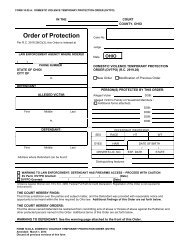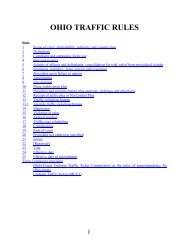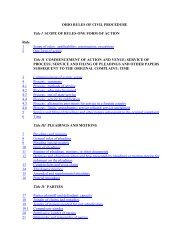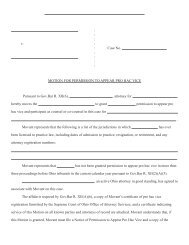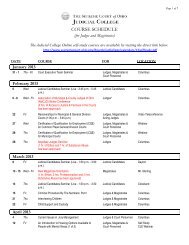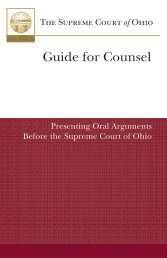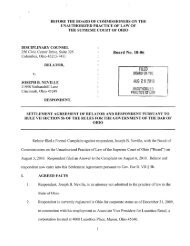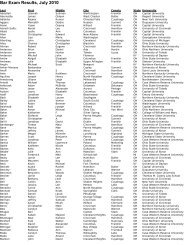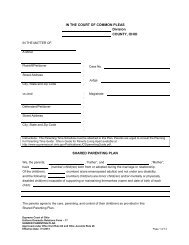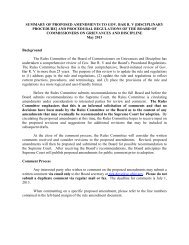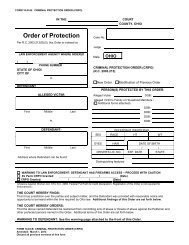disciplinary handbook: volume v - Supreme Court - State of Ohio
disciplinary handbook: volume v - Supreme Court - State of Ohio
disciplinary handbook: volume v - Supreme Court - State of Ohio
Create successful ePaper yourself
Turn your PDF publications into a flip-book with our unique Google optimized e-Paper software.
Peskin, <strong>Ohio</strong> <strong>State</strong> Bar Assn. v.125 <strong>Ohio</strong> St.3d 244, 2010-<strong>Ohio</strong>-1811. Decided 4/29/2010.Case Summaries- 247In June 2007, respondent was arrested and subsequently indicted. Respondent pleaded guilty to possession <strong>of</strong> crackcocaine and resisting arrest and was successfully completed an intervention-in-lieu-<strong>of</strong>-conviction program thatresulted in dismissal <strong>of</strong> all charges. Respondent had a doctorate degree in psychology and worked as a licensedpsychologist for approximately eight years before attending law school. He was the lead trial attorney in largemedical malpractice actions at the time <strong>of</strong> his arrest. He admitted using marijuana occasionally since age 15.He was <strong>of</strong>fered crack cocaine by an acquaintance in 2004 and used it approximately one weekend a month−15 to 20times−over an 18 month period. He attributed the cocaine use to personal difficulties including his wife‘s terminalcancer, his teenage daughter‘s difficulty handling the diagnosis, and his second wife‘s eating disorder andalcoholism. He claimed he was not impaired while working and that his drug use did not interfere with clientrepresentation. He admitted use <strong>of</strong> marijuana and purchase <strong>of</strong> crack cocaine days before filing an importantmotion. He criticized his former employer for notifying clients <strong>of</strong> his arrest. He implied that his conduct was notserious enough to warrant termination <strong>of</strong> his employment. He attributed his firing to a personality clash with apartner and the firm‘s desire to retain his share <strong>of</strong> the fees in two lucrative cases. He did not submit any documentsto support his contention that reporting to a probation <strong>of</strong>ficer for one year and submitting to random drug testingand a substance abuse assessment and a separate assessment by Dr. Horowitz determined that he did not have asubstance abuse problem. He voluntarily contacted OLAP after his arrest and began to attend AA meetings, butafter approximately a year he separated from OLAP under less than amicable circumstances and stopped attendingAA claiming it to be outdated and ineffective. He submitted to psychological evaluation by Dr. Rosenbaum as part<strong>of</strong> the <strong>disciplinary</strong> investigation. Dr. Rosenbaum did not specifically diagnose an addiction to illegal substances,but reported that respondent remains at risk to returning to using cocaine and marijuana and would be bestserved by ongoing monitoring <strong>of</strong> his sobriety for an indefinite period. In mitigation, he does not have a prior<strong>disciplinary</strong> record, there were no dishonest or selfish motives, he gave full cooperation well as six characterreference letters endorsing his quality legal representation and recommending he be permitted to continue practicinglaw. BCGD Proc.Reg. 10(B)(2)(a), (b), (d), and (e). In aggravation, he terminated participation in OLAP, histestimony demonstrates that he fails to appreciate the seriousness <strong>of</strong> his conduct and the substantial risk <strong>of</strong> harm towhich he subjected his clients. He claims to be remorseful, but he resents that he had public humiliation, lost hisjob, and had <strong>disciplinary</strong> proceedings brought against him when, as he claims, others with more significantaddictions and more egregious criminal records have been permitted to deal with their misconduct in private. Boardfound violations <strong>of</strong> Pr<strong>of</strong>.Cond.R. 8.4(d) and (h). Board recommended a two- year suspension, stayed uponconditions. The court distinguished this case from May (2005) where respondent‘s chemical dependency qualifiedas a mitigating factor pursuant to BCGD Proc.Reg. 10(B)(2)(g)(i) through (iv). Here the doctor‘s report does notspecifically diagnose a chemical dependency or state to a reasonable degree <strong>of</strong> medical certainty that respondent isable to engage in competent, ethical, and pr<strong>of</strong>essional law practice. Lacking this mitigating factor and in light hisfailure to acknowledge the seriousness <strong>of</strong> his misconduct and his obvious resentment <strong>of</strong> the consequences, the courtconcluded that an actual suspension was warranted. The court adopted the board‘s finding <strong>of</strong> violations <strong>of</strong>Pr<strong>of</strong>.Cond.R. 8.4(d) and (h), but ordered a suspension for two years with 18 months stayed on the conditionsrecommended by the board, including probation: remain drug-free and alcohol-free and commit no further criminalviolations; enter into a two year drug-related contract with OLAP with random drug screens, but not be required toparticipate in 12 step meetings, instead meet with a OLAP counselor to monitor drug screens and compliance;obtain mental health substance abuse counseling; submit to OLAP and his mental health/ substance abuse counselorthe name and dosage <strong>of</strong> all prescription medications as well as the name and address <strong>of</strong> the prescribing physician;within one year <strong>of</strong> the court‘s opinion submit a qualified health- care pr<strong>of</strong>essional‘s certification that he hassuccessfully completed a substance abuse treatment program and is to a reasonable degree <strong>of</strong> medical certaintyable to practice law in a competent, ethical, and pr<strong>of</strong>essional manner, commit no further misconduct; be monitoredby an monitory attorney and if he failed to comply with conditions serve the entire two year suspension.Rules Violated: Pr<strong>of</strong>.Cond.R. 8.4(d), 8.4(h)Aggravation: (g)Mitigation: (a), (b), (d), (e)Prior Discipline: NO Procedure/ Process Issues: YES Criminal Conduct: YESPublic Official: NO Sanction: Two-year suspension, 18 months stayed



